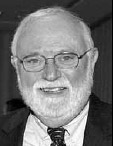
August 29, 2018
Bill Delahunt’s career in public office spanned four decades, from a term representing his hometown Quincy as a state representative and 14 years as a member of Congress. The largest part of his public service career were the 22 years he spent as district attorney in Norfolk County.
Early in his years as a prosecutor, Delahunt established the country’s very first unit on domestic violence and sexual assault cases, and his young assistant DA’s rolled up their sleeves and uncovered historic numbers of rape and sexual assault cases. That experience gave Delahunt a certain level of expertise in such crimes, and he says now that he intends to reach out to the leaders of Boston’s Catholic community and offer advice on dealing with the current crisis.
“I think we heard from Sean O’Malley that it’s time to interact with civilian officials in government, specifically law enforcement. I think that would be a very intelligent move,” Delahunt said in an interview. “It would give a lot of credence to the premise that the church is taking it very seriously now.”
He recommends that the archdiocesan officials seek counsel from current and retired law enforcement officers for methods in dealing with its problems. “It’s not just a question of morality, it’s a question of criminal law as well,” he said, adding that there are “a plethora of people who are retired from law enforcement – not just police but prosecutors, people who have been involved in public service, lawyers who were defense counsel, people from the community” – who can be “resources to validate the sincerity and the commitment of the church. We’re losing many people in terms of the laity, who are waiting for the church to shine the light.”
In the 1970s in Norfolk County, Delahunt said he knew “ viscerally” that the county’s rape and assault numbers were underreported. “We had counselors, people who were trained nurses, physicians, and [we saw] the need for a thoughtful chain of custody approach. We encouraged women to speak out. We went from 35 cases one year to probably over 400 the next year. And these were not ‘stranger rapes’ – it was incest; fathers, brothers, uncles. What that showed is that this was festering, and it was critical that you address that inclination to hide it. Rape got reported pretty well, but these real incestuous situations; we don’t like to talk about them but the reality was that it existed and if you’re going to address it, you had to reveal it, and we did.”
Delahunt sees a parallel between incestuous assault and pedophilia in the church: “If we go and we reveal the truth, however ugly that may be, it will serve the church itself and the laity and the priesthood and all those who are committed Catholics. If you tried to hide the problem, it festers. And that’s what I believe has happened.”
Years ago, even recently, he said, “We had to be careful not to scandalize; well, now we have to be careful to tell the truth, and put it out there- and then we can address it in a very honest way, in a way that the public at large can be confident that we’re doing something about it.”
He added, “We need to know what the truth is and the only way we can get to the truth in my judgment is by some sort of a mechanism separate and apart from the church that has the confidence of the cardinal. And that is the need for a process that is fair – a realization that accusations in and of themselves are simply that. Public opinion can shift, so there has to be a process that allows someone who is accused to say that I didn’t do it, that didn’t happen to me. It has to be an honest. … It is going to be a long and tedious process but I think in the long run that will restore confidence in how the church is handling its problems, and not just for Catholics.”
Summing up, Delahunt said, “I have confidence the church will do it. I have confidence in Pope Francis. I have confidence in Sean O’Malley. I’ve already seen it in comments by the cardinal as to the need to bring in law enforcement. It should be done in a way that’s thoughtful, that reaches out to the horrific behavior, and, again, in a way that’s fair.”

